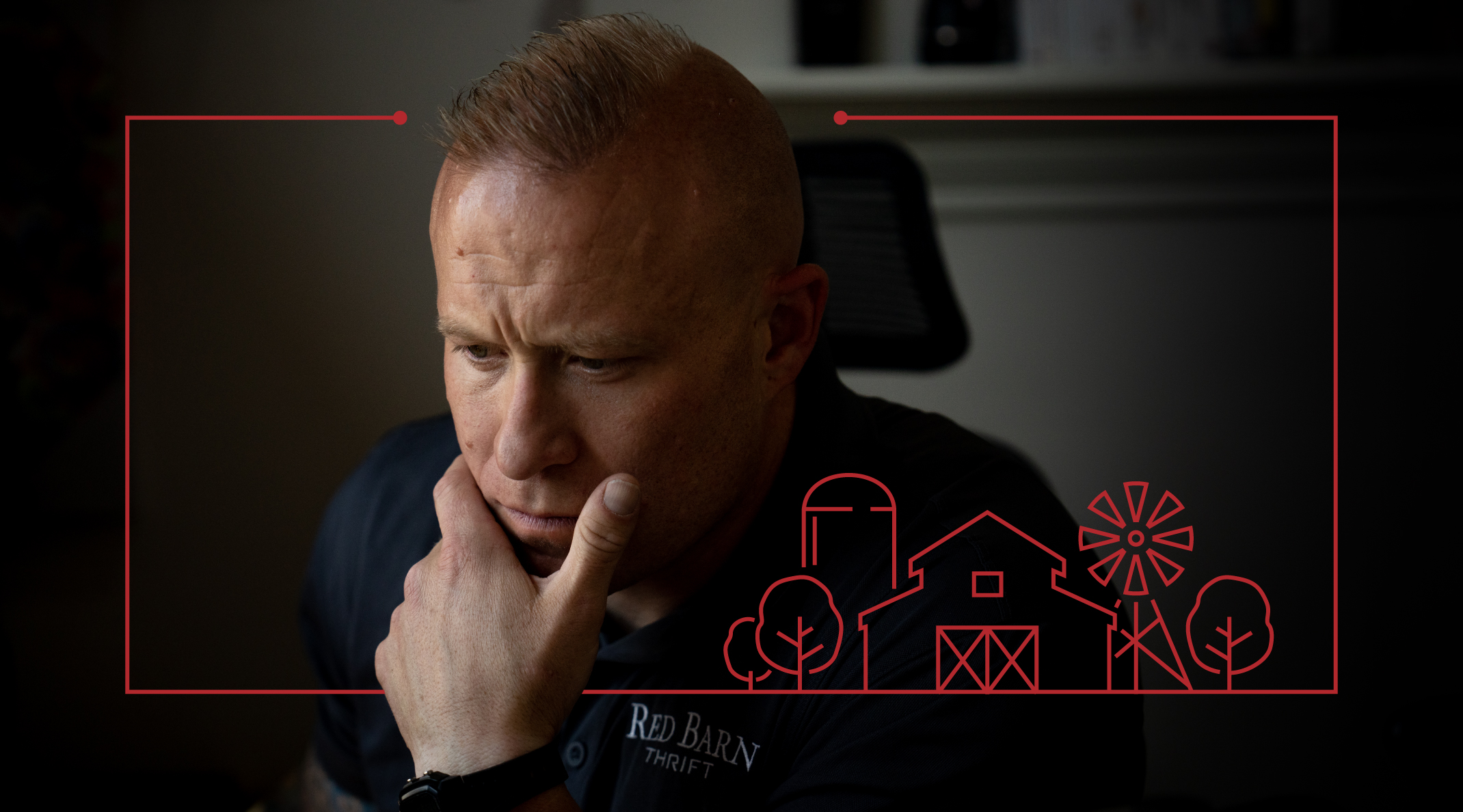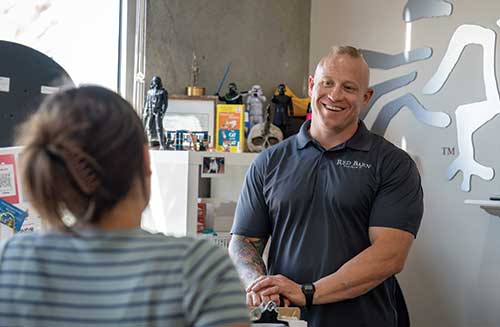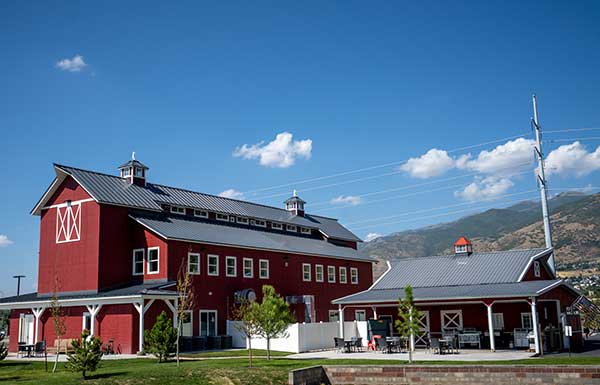
A Chance to Reinvent Yourself
Rachel Badali BS ’17, Marketing & Communications
Three years ago, Jeffrey Reese was in a hotel room in Florida with “no money and no hopes.” He was deep into his battle with alcoholism, and he left his home state of Utah in an attempt to escape failed relationships and burned bridges.
“Something needed to change, or else I was going to start committing crime to get by,” Reese said. “I was most likely going to end up dead, either from drinking myself to death or by taking my own life.”
In Utah, Reese’s mother heard about a local program she hoped could help, and, fearing for her son’s safety, got him an interview. Reese boarded a plane back to Utah and hasn’t looked back since.
At Red Barn Academy, a residential therapeutic center in Farmington, Utah, Reese found a community for men with a history of substance abuse or crime who are seizing chances to create a better future for themselves.
 The academy operates at no cost to insurance or taxpayers. Most of the funding comes from Red Barn’s various enterprises, where many participants work, including a thrift store, restaurant, construction company and moving company, all located near Station Park, the city’s trendy shopping, dining and entertainment district.
The academy operates at no cost to insurance or taxpayers. Most of the funding comes from Red Barn’s various enterprises, where many participants work, including a thrift store, restaurant, construction company and moving company, all located near Station Park, the city’s trendy shopping, dining and entertainment district.
Red Barn students, like Reese, are expected to work hard and take on increased responsibility in the academy’s farm setting for two years or more. They also take part in leadership and job-readiness training. Students can apply for the academy on their own accord, or a judge can grant the option in lieu of jail or prison. Regardless, everyone must go through an interview process and demonstrate a willingness to improve.
Reese calls Red Barn a chance to reinvent himself. He said it represents hope — a place to relearn life skills he describes as being “lost along the way,” and completely new ones. For example, every Friday night, after a week of regimented work from sunrise to sunset, a small group of students meet to learn about supply chain management. They’re part of a collaboration between the Jerry & Vickie Moyes Center for Supply Chain Excellence at Weber State University and Red Barn Academy.
The program, a 40-week training led by Weber State professors, first opened in September 2021. Reese and 11 other students were part of the program’s first graduating class in August 2022. A new cohort began this fall.
Reese was already a Red Barn Movers manager and house leader, helping guide other students, when he learned about the supply chain program. Not wanting to miss a chance to learn new skills, he signed up.
“We all wanted to do the same thing, which is to do something different,” Reese said about himself and his classmates. “Our lives were unmanageable before, because, when times got hard, we turned to our addictions or bad behaviors.”
The course offered possible entry to in-demand career fields such as logistics, warehousing or e-commerce. But, perhaps more important to Reese, it expanded options for the future.
 “My personal goal is financial stability so I can have a family one day,” Reese said. “I want a career, and now I just have more knowledge of different aspects of the world that will be crucial to helping me get there.”
“My personal goal is financial stability so I can have a family one day,” Reese said. “I want a career, and now I just have more knowledge of different aspects of the world that will be crucial to helping me get there.”
Already, Reese is putting that knowledge to good use. He is now a manager at Red Barn Thrift, the program’s thrift shop. And, while he admits he has a busy schedule, he likes the responsibility.
Red Barn students’ work ethic is part of what inspired WSU supply chain faculty to pursue a partnership.
“You give them an assignment or you give them a challenge and they will rise to the occasion,” said François Giraud-Carrier, WSU supply chain management associate professor.
Giraud-Carrier helped create the supply chain curriculum and taught two of the program’s modules. The rest of the course content was split among WSU supply chain faculty members Evan Barlow, Alicia Ingersoll, Ben Neve and Shane Schvaneveldt. Together, they created a program that offers career preparation and college credit.
The program was created with a $110,212 grant from Learn & Work in Utah, an initiative from the Utah Governor’s Office of Economic Development that focuses on upskilling and returning individuals to the workforce. The idea came from WSU alum Matt Williams, a member of the Moyes Center for Supply Chain Excellence advisory board and past Red Barn Academy board member.
Williams was impressed with Red Barn Academy’s work, and he wanted to explore how WSU could help expand Red Barn students’ future employment options. As someone with experience in warehouse operations and other aspects of supply chain, he also recognized valuable qualities, like grit and willingness to learn, within Red Barn students that he believed would allow them to be successful in the supply chain career field.
For Williams and faculty members, the collaboration was also a chance to put WSU’s vision, “transforming lives by meeting all students where they are,” into action.
“There’s a power in education,” said Nancy Tomon, WSU Department of Supply Chain & Management Information Systems administrative specialist. “And there’s a power in helping people see themselves and their futures differently.”
Tomon helped secure the grant funding and worked with Red Barn to get the program up and running.
While a few course participants had past college experience, most didn’t, and this was a way to give them their first taste of higher education. It also provides a pathway to new job experience, as students have the opportunity to begin a supply chain internship once they’ve completed the coursework.
Tomon is helping to set up some of the company partnerships, and there is already high demand for Red Barn graduates, which doesn’t come as a surprise to her.
“It’s inspiring,” she said. “They have high expectations of themselves, they hold themselves accountable, they show up.”
After completing what feels like a job well done, supply chain faculty are excited to begin working with the next cohort of students. The program received another round of Learn & Work grant funding and will continue through 2023.
Now a supply chain training program graduate, Reese said he will keep putting in the work to get closer to his goals. Even when the demands of life build — as they did when he was balancing coursework, multiple jobs and Red Barn responsibilities — he said he’s proving to himself that he can keep going.
“That’s what we do here,” Reese said. “We don’t give up.”
